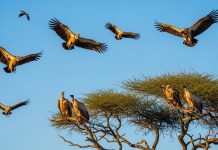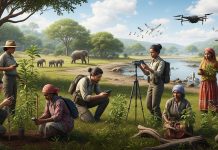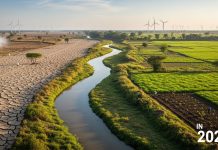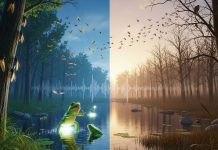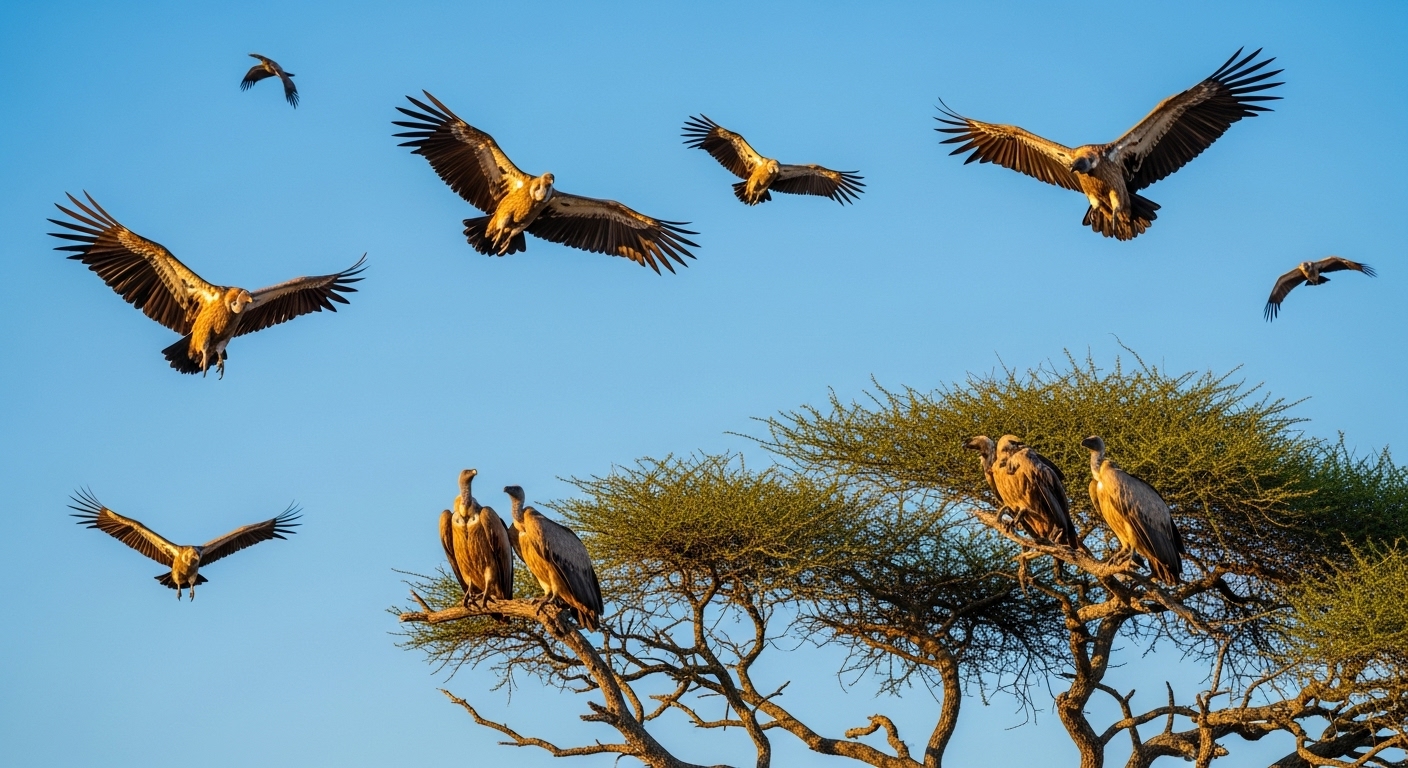Every year, on the first Saturday of September, people around the world pause to celebrate a bird that doesn’t always get the best reputation: the vulture. Known officially as International Vulture Awareness Day (IVAD), this observance started in 2009 as a joint effort between South Africa’s Birds of Prey Programme and the UK’s Hawk Conservancy Trust. Since then, it has evolved into a global movement, with conservation organizations, schools, and communities joining forces to raise awareness about the importance of vultures and the urgent need for their protection.
Nature’s Cleanup Crew
Vultures may not be as glamorous as eagles or as colorful as parrots, but their role in nature is unmatched. They act as “nature’s cleanup crew”, feeding on dead animals before these carcasses can rot and spread disease. Their digestive systems are incredibly strong, capable of destroying harmful bacteria and pathogens, including anthrax, rabies, and botulism.
In doing this, vultures protect both humans and wildlife from dangerous outbreaks. They also recycle nutrients back into the ecosystem, thereby maintaining natural balance. When vultures disappear, other scavengers, often less efficient ones like feral dogs, increase the risk of diseases spreading into human communities. Simply put: without vultures, the health of entire ecosystems, including people, is at risk.
A Grim Population Decline
Sadly, vultures are among the most threatened bird species in the world today. Africa, in particular, has seen shocking declines. According to the IUCN Red List, four of Africa’s 11 vulture species are now Critically Endangered, with population drops of up to 97% in some regions.
Key species in West Africa and Nigeria include the Hooded Vulture, White-backed Vulture, Lappet-faced Vulture, White-headed Vulture, and Rüppell’s Vulture. All of these species face steep declines and, without intervention, may vanish within a few decades.
Globally, other species such as the Egyptian Vulture, Griffon Vulture, and Bearded Vulture are also under severe pressure. The loss of these birds would not only be an ecological tragedy but also a public health disaster.
Why Are Vultures Disappearing?
Several human-driven threats are pushing vultures toward extinction:
- Poisoning: Sometimes predators like lions or hyenas are targeted with poisoned carcasses. Vultures, being scavengers, feed on the same carcasses and die in large numbers. In some incidents, hundreds have been wiped out at once.
- Illegal trade: Vulture body parts are sold in traditional medicine markets, especially in West Africa, where they are believed to bring luck, protection, or healing.
- Habitat loss: Expanding farms, roads, and cities reduce the safe spaces vultures need for nesting and feeding.
- Infrastructure: Power lines, wind turbines, and other developments lead to accidental collisions and electrocution.
- Veterinary drugs: Medicines like diclofenac, used on livestock, are toxic to vultures when they eat treated carcasses.
A Cultural Snapshot
In Africa and Nigeria, vultures also hold cultural significance. Among the Yoruba, the vulture (ìgun) is regarded as a sacred messenger of the divine. Other communities see them as either spiritually powerful or unclean, depending on local traditions. While some beliefs have helped protect vultures, others unfortunately fuel the demand for their body parts. This mix of reverence and exploitation reveals how deeply vultures are intertwined with human societies, for better and for worse.
Conservation Efforts
Thankfully, many organizations and communities are fighting back.
- The Vulture Conservation Foundation (VCF) and BirdLife International lead international research, education, and conservation programs for vultures.
- In Nigeria, the Nigerian Conservation Foundation (NCF) raises awareness, monitors populations, and collaborates with law enforcement to curb illegal trade.
- The West African Vulture Conservation Action Plan (WAVCAP 2023–2043) is a long-term regional strategy spanning 16 countries aimed at addressing poisoning, illegal trade, and habitat loss.
- Local projects also include creating “Vulture Safe Zones”, promoting alternatives to harmful veterinary drugs, and engaging with traditional healers to reduce the demand for vulture parts.
These efforts combine modern science with community action, demonstrating that conservation is most effective when local people are involved.
Why Awareness Matters
World Vulture Day is about saving the balance of nature. Schools, NGOs, and communities use this day to host events such as art competitions, lectures, and field demonstrations. The goal is to inspire people, especially young people, to view vultures not as dirty scavengers, but as essential allies in maintaining a healthy environment.
Looking Ahead
The outlook is challenging, but not hopeless. If nothing changes, many vulture species could vanish within our lifetime, with disastrous consequences for ecosystems and public health. But with stronger laws, better education, safer veterinary practices, and active community participation, we can turn the tide.
The lesson is clear: protecting vultures means protecting ourselves. The next time you see a vulture circling overhead, don’t think of it as a symbol of death. Think of it as a guardian, silently doing the hard, dirty work that keeps our world clean and safe.


